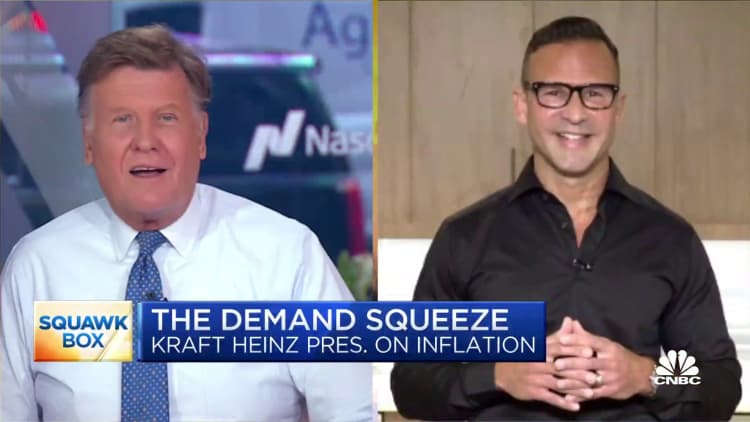“As we create more premium beverages, it becomes more difficult for customers to replicate it at home and we think that helps with the concept of trade down,” Starbucks CFO Rachel Ruggeri told CNBC’s “Squawk Box” on Aug. 3.Gary Hershorn / Contributor / Getty ImagesPersonalized coffees, “prestige” skincare and “elevated” sauces and spreads are just some examples of how companies like Starbucks, Unilever and Kraft Heinz are tilting their focus toward premium products — and consumers appear to be loving it.But why are companies zooming in on their pricier offerings when consumers are feeling the effects of the biggest inflation shock in decades?related investing news
What to expect when Costco reports earnings after the closing bell Thursday”Customer insight is key for consumer businesses as the cost of living squeeze tightens,” Paul Martin, KPMG’s U.K. Head of Retail, told CNBC.”Whilst it’s true that some consumers are having to increasingly turn to value products and watch every penny, it is also the case that other consumers are nervous about the economic outlook but still have money to spend and are in essence trading down to premium products,” Martin said.”For example, swapping meals out for premium meals in. Whilst this group will also look to save money via the value essentials, they won’t be filling the basket solely with them,” he said.’An offering that’s worth paying for’Starbucks reported record customer counts and sales in the last quarter, beating Wall Street expectations. The results appear to reaffirm the view that some customers aren’t trading down or reducing their spending despite the increasing cost of living.Designing bespoke products is key to upping customer engagement even when money is tight, Starbucks CFO Rachel Ruggeri told CNBC’s “Squawk Box” on Aug. 3.”As we create more premium beverages, that’s more difficult for customers to replicate at home and we think that helps with the concept of trade down,” Ruggeri said. “It may mean that maybe a customer doesn’t come as frequently, but we want to ensure that we have reasons for the customers to come into the stores and interact with us.”Giving customers more flexibility also helped to sell more expensive products and pass on higher costs, Ruggeri said. “We’ve been able to do that through our personalization, which is a choice, and what we’ve seen so far is our demand is strong. And that tells us that we have an offering that’s worth paying for,” she said.The focus on premium products isn’t unique to the largest coffee chain in the U.S.Kraft Heinz is getting in on the luxury market with the launch of its HEINZ 57 Collection in July. The “chef-inspired” condiments are “designed to add magic to the culinary experience,” according to the company.This came as the company lifted prices by more than 12% in response to higher transportation, labor and ingredients costs amid rising inflation.
 The introduction of more premium products is in addition to redesigns of classic products, according to the company’s U.S. president Carlos Abrams-Rivera.”One focus is how do we optimize formulas to bring in ingredients that are cheaper,” Abrams-Rivera told CNBC’s “Squawk Box” on July 28. “And how do we customize our products to the different consumers so they can access different products at different price points.”Treading a similar path is Mondelez. The company announced in June a deal to acquire organic-focused Clif Bar & Company, while all the company’s 2021 acquisitions — Hu Master Holdings, Lion/Gemstone Topco and Gourmet Food Holdings — were described as “premium” in its second-quarter earnings report.’Value faces a boom and so does premium’Unsurprisingly, consumers are also reliant on cheaper products, which companies are also sensitive to.McDonald’s, for example, attributed some of its growth in the U.S. to its value products in its Q2 2022 earnings report.Other companies are looking to attract both ends of the market by focusing on higher and lower-priced products.Nestle CEO Mark Schneider told investors in the company’s half-year results earnings call that the approach has been used before.”What we’re seeing with the current situation is similar to what happened in previous economic slowdowns and downturns,” Schneider said. “We pay attention to premium products but we also pay attention to affordable products. By covering both ends of this spectrum we’re doing well and we’re serving those needs.”Appealing to the widest possible customer base is key to maintaining and growing profits in the current economic climate, according to KPMG’s Martin.”In this landscape, value faces a boom and so does premium. Supermarkets recognize it, including the discounters, who are expanding their core value ranges, but also beefing up their premium proposition. Their aim is to capture and retain all of the trade-down audiences,” Martin said.Driving desirability and salesUnilever CEO Alan Jope told CNBC’s “Squawk Box” that the company was seeing a mixture of customers trading up and trading down.”The premium ranges in our portfolio are actually doing very well … We are seeing some downtrading – that’s on pack size, where people are moving to more affordable formats,” he said on July 26.In 2014, Unilever launched Prestige, a luxury arm of the conglomerate that now includes Dermalogica, Tatcha and Paula’s Choice.Described as “a string of pearls” by Executive VP and Group CEO Vasiliki Petrou in December, the model relies on “a certain level of scarcity” to drive desirability and sales.So far, it appears to have worked. Beauty & Personal Care grew 7.5% in the last quarter, driven by “strong growth” in Prestige Beauty and Health & Wellbeing, according to the company’s Q2 2022 results announcement.A focus on premium products can also be a more palatable means of tackling inflation costs compared to reducing items or packaging sizes, according to EY global consumer leader Kristina Rogers.”There is a limit to these actions and considering that input costs continue to rise, companies are looking at how to expand the value of their products,” Rogers told CNBC.”The only way to grow is therefore to go the premium and added value route. Companies need to demonstrate the added value of their brands and give consumers a good reason to buy higher-priced products,” Rogers said.”Companies are focusing on increasing the features of their product to extend consumers’ willingness to pay. These features include brand building, higher quality products, sustainability, or health features, to help validate a higher premium to be charged,” she added. .
The introduction of more premium products is in addition to redesigns of classic products, according to the company’s U.S. president Carlos Abrams-Rivera.”One focus is how do we optimize formulas to bring in ingredients that are cheaper,” Abrams-Rivera told CNBC’s “Squawk Box” on July 28. “And how do we customize our products to the different consumers so they can access different products at different price points.”Treading a similar path is Mondelez. The company announced in June a deal to acquire organic-focused Clif Bar & Company, while all the company’s 2021 acquisitions — Hu Master Holdings, Lion/Gemstone Topco and Gourmet Food Holdings — were described as “premium” in its second-quarter earnings report.’Value faces a boom and so does premium’Unsurprisingly, consumers are also reliant on cheaper products, which companies are also sensitive to.McDonald’s, for example, attributed some of its growth in the U.S. to its value products in its Q2 2022 earnings report.Other companies are looking to attract both ends of the market by focusing on higher and lower-priced products.Nestle CEO Mark Schneider told investors in the company’s half-year results earnings call that the approach has been used before.”What we’re seeing with the current situation is similar to what happened in previous economic slowdowns and downturns,” Schneider said. “We pay attention to premium products but we also pay attention to affordable products. By covering both ends of this spectrum we’re doing well and we’re serving those needs.”Appealing to the widest possible customer base is key to maintaining and growing profits in the current economic climate, according to KPMG’s Martin.”In this landscape, value faces a boom and so does premium. Supermarkets recognize it, including the discounters, who are expanding their core value ranges, but also beefing up their premium proposition. Their aim is to capture and retain all of the trade-down audiences,” Martin said.Driving desirability and salesUnilever CEO Alan Jope told CNBC’s “Squawk Box” that the company was seeing a mixture of customers trading up and trading down.”The premium ranges in our portfolio are actually doing very well … We are seeing some downtrading – that’s on pack size, where people are moving to more affordable formats,” he said on July 26.In 2014, Unilever launched Prestige, a luxury arm of the conglomerate that now includes Dermalogica, Tatcha and Paula’s Choice.Described as “a string of pearls” by Executive VP and Group CEO Vasiliki Petrou in December, the model relies on “a certain level of scarcity” to drive desirability and sales.So far, it appears to have worked. Beauty & Personal Care grew 7.5% in the last quarter, driven by “strong growth” in Prestige Beauty and Health & Wellbeing, according to the company’s Q2 2022 results announcement.A focus on premium products can also be a more palatable means of tackling inflation costs compared to reducing items or packaging sizes, according to EY global consumer leader Kristina Rogers.”There is a limit to these actions and considering that input costs continue to rise, companies are looking at how to expand the value of their products,” Rogers told CNBC.”The only way to grow is therefore to go the premium and added value route. Companies need to demonstrate the added value of their brands and give consumers a good reason to buy higher-priced products,” Rogers said.”Companies are focusing on increasing the features of their product to extend consumers’ willingness to pay. These features include brand building, higher quality products, sustainability, or health features, to help validate a higher premium to be charged,” she added. .
Nigeria: Kizz Daniel Apologises to Tanzanians, Promises Free Show for Fans
“I didn’t mean to disrespect the fans. It was never intentional. I wanted to perform”.
Nigerian music star Kizz Daniel has apologised to Tanzanian music fans for failing to show up at a Summer Amplified Show.
Str8up Vibes organised the event.
The organisers arrested the Buga hitmaker for failing to perform at Sunday night’s well-publicised show.
The singer’s absence angered fans who came to see him perform, causing them to thrash the show’s venue.
The organisers of the Summer Amplified Show in Tanzania arrested the Buga hitmaker for failing to perform at the well-publicised show on Sunday night.
In an interview session with radio personality Daddy Freeze, the show promoter Steven Uwa said that Kizz Daniel opted out of the show because the airline he flew with did not bring all his baggage.
The show promoter revealed that Kizz Daniel was booked for $60,000.
He also revealed that he spent nothing less than $300,000 on the show because it was a premium event.
He also lamented the flimsy reason the singer gave after he failed to perform and explained why he got him arrested.
Apologies
Addressing a press conference in Tanzania, Kizz Daniel said he had agreed with Str8up Vibes that the show must go on.
“We agreed to put up a show on Friday. A free show. So, I will be partnering with Str8up Vibes.
Also, I must apologise to the fans. None of this was intentional. I love my job. Mainly, I love performing.
“I didn’t mean to disrespect the fans. It was never intentional. I wanted to perform. I came to Tanzania to perform, but due to some circumstances way over my power, we couldn’t make that happen.

Sign up for free AllAfrica Newsletters
Get the latest in African news delivered straight to your inbox
Success!
Almost finished…We need to confirm your email address.To complete the process, please follow the instructions in the email we just sent you.
Error!
There was a problem processing your submission. Please try again later.
“I apologise once again to the people of Tanzania, and I hope you guys give me another chance to give you a show, to give you a proper show, a beautiful show,” the ‘Buga’ crooner said.
Reasons for absence
Explaining the reason behind his missing the show, Kizz Daniel said when he arrived in Nairobi from Kampala, the plane he was supposed to fly in (connecting flight) had already departed.
He then stayed in Nairobi for eight hours and got a connecting flight at 8:30 p.m.
Upon arriving in Dar es Salaam, he said he discovered that some of his belongings had been forgotten.
“The organisers assured me we’d get other equipment. We arrived at the hotel at 9 p.m. and sent my band to the hall to practice.
“Unfortunately, the band failed because the fans had already entered the venue.
“I tried contacting the designers here to get clothes. When I decided to leave the venue, I was told it was unsafe already. The fans got angry”.
“We agreed with the organisers that we will apologise to the fans and organise another show.
“On the second day, news spread and the police followed me to the hotel, not to arrest me but to question me about what happened,” he said.
.
Lagging economy could delay construction of battery plant in Queen Creek – Daily Independent
BS Number Wise: Taking stock of Indian markets’ valuation premium
Professors Benjamin Graham and David Dodd, two of billionaire Warren Buffet’s gurus, noted in 1934 that stock market investors once required a company’s earnings yield to be higher than prevailing bond yields as stocks were considered riskier than bonds. Investors banked on dividend income then. And this was broadly the equivalent of insisting that you earned more from your dividend than your fixed deposit, because share prices can fall. This approach was already considered old-fashioned when they described it in their seminal work, Security Analysis. Inflation, …
Key stories on business-standard.com are available to premium subscribers only.
Already a premium subscriber? LOGIN NOW

MONTHLY STAR
Business Standard Digital
![]()


Business Standard Digital Monthly Subscription

Complete access to the premium product

Convenient – Pay as you go

Pay using Amex/Master/VISA Credit Cards and VISA Debit Cards Only

Auto renewed (subject to your card issuer’s permission)

Cancel any time in the future
Note: Subscription will be auto renewed, you may cancel any time in the future without any questions asked.
Requires personal information
What you get?
ON BUSINESS STANDARD DIGITAL
- Unlimited access to all the content on any device through browser or app.
- Exclusive content, features, opinions and comment – hand-picked by our editors, just for you.
- Pick 5 of your favourite companies. Get a daily email with all the news updates on them.
- Track the industry of your choice with a daily newsletter specific to that industry.
- Stay on top of your investments. Track stock prices in your portfolio.
- 18 years of archival data.
NOTE :
- The product is a monthly auto renewal product.
- Cancellation Policy: You can cancel any time in the future without assigning any reasons, but 48 hours prior to your card being charged for renewal.
We do not offer any refunds. - To cancel, communicate from your registered email id and send the email with the cancellation request to [email protected]. Include your contact number for speedy action.
Requests mailed to any other ID will not be acknowledged or actioned upon.

SMART ANNUAL
Business Standard Digital
Subscribe Now and get 12 months Free
![]()


Business Standard Premium Digital – 12 Months + 12 Months Free

Subscribe for 12 months and get 12 months free.

Single Seamless Sign-up to Business Standard Digital

Convenient – Once a year payment

Pay using an instrument of your choice -all Credit and Debit Cards, Net Banking, Payment Wallets, and UPI

Exclusive Invite to select Business Standard events
Note: Subscription will be auto renewed, you may cancel any time in the future without any questions asked.
What you get
ON BUSINESS STANDARD DIGITAL
- Unlimited access to all content on any device through browser or app.
- Exclusive content, features, opinions and comment – hand-picked by our editors, just for you.
- Pick 5 of your favourite companies. Get a daily email with all the news updates on them.
- Track the industry of your choice with a daily newsletter specific to that
industry. - Stay on top of your investments. Track stock prices in your portfolio.
NOTE :
- The monthly duration product is an auto renewal based product. Once subscribed, subject to your card issuer’s permission we will charge your card/ payment instrument each month automatically and renew your subscription.
- In the Annual duration product we offer both an auto renewal based product and a non auto renewal based product.
- We do not Refund.
- No Questions asked Cancellation Policy.
- You can cancel future renewals anytime including immediately upon subscribing but 48 hours before your next renewal date.
- Subject to the above, self cancel by visiting the “Manage My Account“ section after signing in OR Send an email request to [email protected] from your registered email address and by quoting your mobile number.
 Dear Reader,
Dear Reader,
Business Standard has always strived hard to provide up-to-date information and commentary on developments that are of interest to you and have wider political and economic implications for the country and the world. Your encouragement and constant feedback on how to improve our offering have only made our resolve and commitment to these ideals stronger. Even during these difficult times arising out of Covid-19, we continue to remain committed to keeping you informed and updated with credible news, authoritative views and incisive commentary on topical issues of relevance.
We, however, have a request.
As we battle the economic impact of the pandemic, we need your support even more, so that we can continue to offer you more quality content. Our subscription model has seen an encouraging response from many of you, who have subscribed to our online content. More subscription to our online content can only help us achieve the goals of offering you even better and more relevant content. We believe in free, fair and credible journalism. Your support through more subscriptions can help us practise the journalism to which we are committed.
Support quality journalism and subscribe to Business Standard.
Digital Editor
First Published: Wed, June 01 2022. 06:10 IST !function(f,b,e,v,n,t,s){if(f.fbq)return;n=f.fbq=function(){n.callMethod?n.callMethod.apply(n,arguments):n.queue.push(arguments)};if(!f._fbq)f._fbq=n;n.push=n;n.loaded=!0;n.version=’2.0′;n.queue=[];t=b.createElement(e);t.async=!0;t.src=v;s=b.getElementsByTagName(e)[0];s.parentNode.insertBefore(t,s)}(window,document,’script’,’https://connect.facebook.net/en_US/fbevents.js’);fbq(‘init’,’550264998751686′);fbq(‘track’,’PageView’); .
India’s Wheat Ban Defies Economic Logic
India’s decision to restrict wheat export is disappointing but not a big surprise. Banning exports has been the government’s standard response to any shortage of agricultural commodities, denying farmers the benefit of global prices when these are high. The political economy favours the government taking tough measures to protect the consumers — more numerous and more vocal than producers — even if these measures go against the grain of economic sense.
The government has banned new wheat export contracts by the private sector, leaving it open for the government to still export wheat through the government-to-government channel. India’s good neighbourliness depends on sustaining the regular export of wheat to Bangladesh and the humanitarian aid to Afghanistan.
Why is there a shortage of wheat? There is no absolute shortage. This year’s wheat production was expected to be a record 111 million tonnes, but the recurrent cycles of dry and hot weather from March onwards have shrivelled the burgeoning kernels of the wheat crop in most wheat-growing areas other than Madhya Pradesh, where the crop is harvested by mid-March. As a result, the current wheat output estimate is 97 million tonnes. Not that this is a particularly miserable output, particularly as Indians do not really feed grain to animals to eat their meat later on. However, the government has not been as successful this year in procuring wheat as in the past.
This is because of the steep rise in global wheat prices, by as much as 45%, as supplies from Russia, the biggest exporter of wheat, and Ukraine, the fifth-largest exporter, have been thwarted this year, thanks to the war. Private exporters of wheat have been offering farmers prices significantly higher than the minimum support price at which the government procures its requirement, ₹2,015 per quintal.
Still, the government is expected to procure 18.5 million tonnes. Combined with an opening stock of 19 million tonnes accumulated from procurement in past years, the government should command 37.5 million tonnes. The buffer stocking norm for 1 April is 7.5 million tonnes. That leaves the government with 30 million tonnes, enough to meet the requirements of the public distribution system and regular welfare measures. However, the pandemic relief by way of the Pradhan Mantri Garib Kalyan Yojana, under which 800 million people are entitled to, in addition to their regular supply under the public distribution system, 5 kg of rice/wheat and 1 kg of lentils per person per month for free, has seen considerable additional offtake of wheat and rice. Therefore, allocations to this scheme would need to be curtailed unless the government wants to augment its procurement at a higher price or tell the would-be buyer that she is welcome to the grain of her choice, so long as it is rice.
Against the buffer stocking norm of 13.6 million tonnes of rice for 1 April, the Food Corp. of India held 33.3 million tonnes of rice and 26.6 million tonnes of paddy (after milling, it would yield some 19 million tonnes of rice) as of 1 May.
Does it not make sense to ban food export when its politically sensitive price goes up globally and could trigger a domestic shortage? As a desperate measure, yes, it does. Not just wheat flour but bread and biscuits are at risk of a spike in prices, especially with the shortage of edible oils, following the cessation of supplies of sunflower seeds/oil from Ukraine, a major supplier, and an export ban on palm oil in Indonesia. Baked goods are made from wheat, edible oils and energy. The prices of all three ingredients have risen sharply. So why not ban exports of wheat and contain at least one price?
As a strategic response, banning the export of agricultural commodities lacks sense. A market price at a premium to the minimum support price is a development altogether to be desired. That would allow the government to move away from open-ended grain procurement and create a procurement price separate from the MSP. Such a strategy works best when a market for futures and options is functional for wheat and rice. But futures and options have been banned in grain and several other commodities.
It is conceivable that the government could procure its minimum stocking norm while contracting supplies as needed in the futures market, competing with private trade to secure enough grain to meet its welfare requirements, and seeking delivery at the distributed destinations in different parts of states. This would let the private sector efficiently store food stocks and transport them around the country to reduce the Food Corp. of India’s expenses on similar functions and spoilage and pilferage. Moreover, allowing a market to function in agricultural commodities would permit farmers to cultivate crops in short supply, diversifying away from grain.
But the zeal the government showed in pushing its farm laws through the legislature is not visible when it comes to grabbing an opportunity presented to it by global developments to get India’s agricultural act closer to where it should be instead of relying primarily on subsidy.
Subscribe to Mint Newsletters * Enter a valid email * Thank you for subscribing to our newsletter.
.










